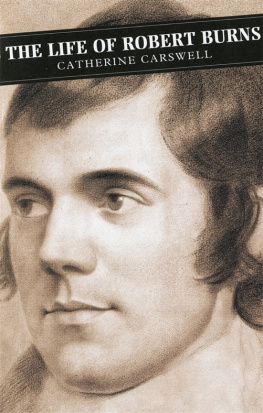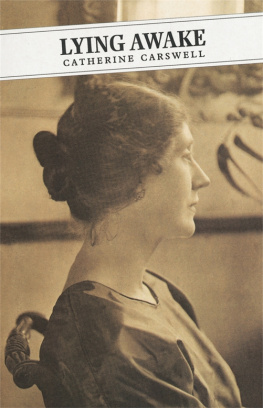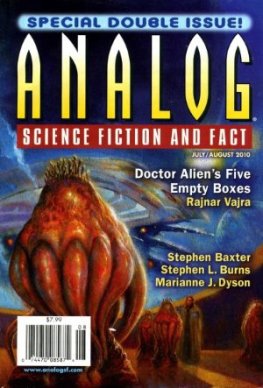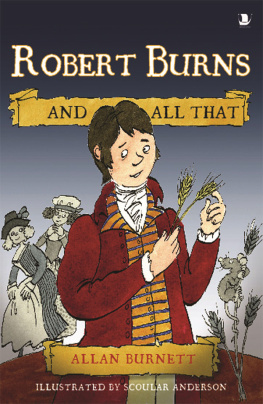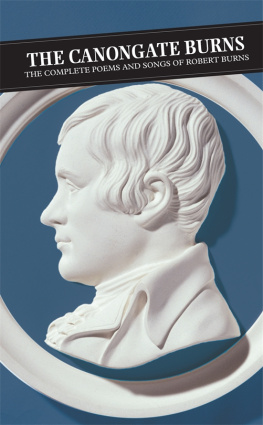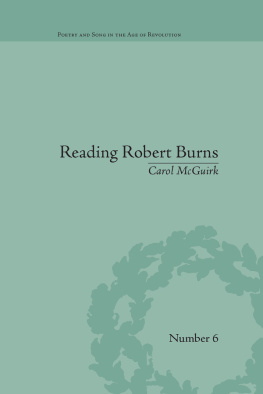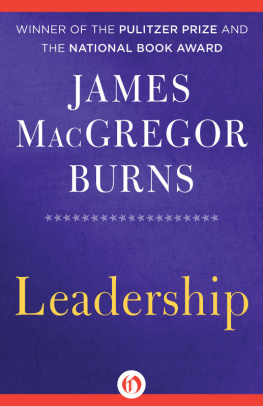Catherine Carswell gives us a Burns seen through the glass of her own temperament and mediated by the example of her mentor, D.H. Lawrence. Lawrence had admired Burns from his youth, and towards the end of 1912 he toyed with the idea of writing a novel around the Scots poets life and personality. On 17 December he wrote to his friend Arthur Macleod:
I shall make him live near home, as a Derbyshire manand shall fictionise the circumstances. But I have always loved him, in a way. He seems a good deal like myselfnicer in most ways. I think I can do him almost like an autobiography.
In the two fragments of Chapter 1 which have survived there is a big boned, limber youth of twenty, presumably the Burns figure, with expressive brown eyes and a young, eager, peasant face; whose big, raw-boned wrists moved with an intimate intelligence; and who knows more songs than any lad i th country. We see him free a rabbit from a snare: it was a living little rabbit-person with dark eyes terrified as the mouse was of Burns. Later he has a brief night-meeting with a girl: she was breathing against him, live and warm like the rabbit. And it was the darkness he was kissing, discovering. It was the night he had his mouth upon. Even at twenty, the Carswell Burns is demonstrably more complex and sophisticated than this character of Lawrences, but the kinship is unmistakable.
A year after he had given up all idea of this novel, Lawrence was making Burns into the symbol of a true, honest attitude to sex and the body, in contrast to the more cerebral authors, and above all the prose writers, of the nineteenth century:
A big man is big because his power, his horse-power or vital power, is greateven Shelley and Keats, had terrific vital power. Some men could catch up their sex and everything into their headsbut poets not. Most poets die of sexKeats, Shelley, Burns. I cant understand it myself, not a bit Theyve allnot BurnsBaudelaire, Verlaine and Flaubertgot about them, the feeling that their own flesh is uncleancorrupt. And their art is the art of self hate and self-murder.
(To Henry Savage, 15 November 1913)
When Mrs Carswell began serious work on Burns, Lawrence wrote enthusiasticallyand warninglyto her husband:
Caths idea of a Burns book I like very much: I always wanted to do one myself, but am not Scotchy enough. I read just now Lockharts bit of a life of Burns. Made me spit! Those damned middle-class Lockharts grew lilies of the valley up their arses to hear them talk. If Cath is condescending to Burns, I disown her. He was quite right, a mans a man for a that, and its not a bad poem. He means what he says. My word, you cant know Burns unless you can hate the Lockharts and all the estimable bourgeois and upper classes as he really didthe narrow-gutted pigeons. Dont, for Gods sake, be mealy-mouthed like them. Id like to write a Burns life. Oh, why doesnt Burns come to life again and really salt them!
(To Donald Carswell, 5 December 1927)
In view of Lawrences diatribe it is of some interest that the Glasgow Herald made Lockhart its touchstone; its tepid and ultimately dismissive review claimed that the book fails to present as full and true a portrait as Lockharts excellent Life (16 October 1930). In the previous month the Daily Record, a mass circulation popular newspaper in Scotland, hadand this prior to the publication dateprinted extracts in five successive numbers. All hashed about of course, the author wrote to F. Marian McNeill on 17 September, but it comes through wonderfully well and Im so glad of the chance to get at the common reader for whom the book is fundamentally intended. The highbrows can fall into line later if they like. On three days a week for over a month the Record devoted at least a couple of columns to the reactionletter after letter of what Arnold Bennett termed storms, cascades, cyclones of howling and protesting fury, relieved by only a few approving comments. John S. Clarke, Labour mp for Maryhill, saw Carswell as a kind of body-snatcher engaged in the resurrection of the ghoulish remains of great men. To those who had found no truth in the extracts, a woman reader replied that there was indeed truth: rotten truthand the female victims of the poets lust knew that to their bitter sorrow. Burns was a literary genius, but as a man he was beneath contempt and Catherine Carswell is deserving of commendation for having emphasised this fact. The issue of 29 September is typical:
BOYCOTT NEW BURNS LIFE
ATTACK BY WOMEN READERS
WOMANHOOD DEGRADED
The first of these headlines points to a very real threatthat the Burns Federation bigwigs of that day (so different from their successors in the 1980s) would actually manage to have the book suppressed. Stewart Seggie, President of the Ninety Burns Club, Edinburgh, is ominously and prophetically quoted: If [my italics] this book is published this year, it will be killed at the Burns Festival in January. Mr Seggie must have had inside information, for certain figures in the Burns world were trying to get Chatto and Windus to withdraw the book on the pretext that the Federations copyright had been infringed. They had no sustainable case; the exchange of solicitors letters was printed in the Record; and further details can be found among the thirteen letters from Mrs Carswell to J. de Lancey Ferguson, the great American Burns scholar, in the Mitchell Library, Glasgow. The parallel with the attack on Salman Rushdies The SatanicVerses seems even stronger when one learns that Mrs Carswell received a bullet through the post from a correspondent who signed himself Holy Willie and urged her, by using the enclosed in a quiet corner, to leave the world a better and cleaner place.
After three weeks of unfettered comment, the Record printed a lengthy review by William Power on 7 October. Never before has the poet been so convincingly or fully presented,he wrote; she sees Burns as an artist in living passionate, intense, wayward and various. And ten days later, on 17 October, C.M. Grieve (Hugh MacDiarmid) lent his powerful support in the form of a long letter, though even so he could not resist a little quiet irony at Burnss expense: She is guiltless alike of white-washing and muck-raking I have read the book with absorbed interestnot because of its subject, but because of Mrs Carswells handling. The majority of the books opponents, however, saw nothing in it but muck-raking. The most splendidly vacuous of all the anathemas was pronounced by the Reverend Lauchlan McLean Watt in the BurnsChronicle for 1932:
It is essentially a long list, chapter, by chapter, of all that he did wrong; his side-slips from virtue; the women who, carried off their feet by his passionate personality, bore children to him; and the men who drank with him, shouted the choruses of their class with him, got him to write things that outrivalled the candid impurity of old skulduddery fragments the farm-hinds had sung for generations in their wretched bothies; till, at the last miserable page, when you see his poor broken body laid in the grave by a strutting crowd of nobodies, you almost feel as though you ought to be glad that a sordid life is finished It is not far off from being the kind of record Satan might keep near the door of his dark abode, lest a repentant sinner might slip into higher places of peace after struggle, failure, and victorya book he might bring forward to prove a poor souls previous convictions, in some final Court of Spiritual Common Pleas It is, in much, an undocumented libel on the dead, compiled on a method of smelling out stories that have grown putrid long ago in the corners where even what had no love or pity in it was content to leave them to oblivion.
What strikes todays reader, sixty years after all the pother, is that the book is a noble work of fiction in the best sense of the wordthat which is made (as a makar makes poetry), quite apart from the arguable correctness of its presentation of minor details, or even of crucial incidents. Of the major episodes which are open to question today, the most sensational are his affair with Mary Campbell (Highland Mary) in 1786, and the break with Maria Riddel towards the end of his life. All the scanty evidence we have concerning Highland Mary points to a bigamous marriage by declaration followed by her death from typhus. But we can no longer accept that the bones in the childs coffin found in the lair where she was buried are necessarily those of

